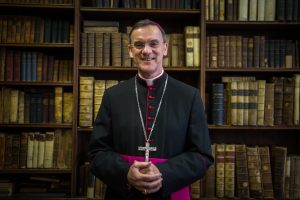Pope Francis’ new document calls political powers to step up response to climate emergency
Posted October 5, 2023

The following is a guest blog by Bishop John Arnold of the Diocese of Salford, renowned for his dedicated advocacy for environmental causes. As the Spokesperson on the Environment for the Catholic Bishops Conference of England and Wales, Bishop Arnold’s insights and reflections are highly sought after in the context of ecological concerns. Here he delves into Pope Francis’s apostolic exhortation, Laudate Deum, shedding light on its core messages and its implications for the global Catholic community.
This week, Pope Francis published a new apostolic exhortation calling “all people of good will” to take urgent action on the climate crisis.
The document, entitled Laudate Deum, encourages all to take rapid and ambitious action to address the needs of the planet and of our brothers and sisters around the world.
This latest text follows on from Pope Francis’ 2015 encyclical Laudato Si’, a call to all people to recognise the damage we are inflicting on our planet and to respond to our duty to be stewards of creation.
People around the world responded magnificently to Laudato Si’ – people of all faiths and none. Over the years, religious leaders have been taking bold action to tackle our ecological crisis. It was a particular privilege for me to co-lead a multi-faith visit to The Vatican earlier this year with representatives from Christian, Jewish, Islam, Hindu, and Sikh communities – as well as civic leaders – from across Greater Manchester. The visit, which took place in April, included a private audience with Pope Francis, during which leaders made an interfaith pledge to take concrete action to care for our common home.
And that’s not all. Our young people are fantastic – their enthusiasm for Laudato Si’ and to be good stewards of creation is remarkable and provides us with so much hope for the future of our planet and our Church as they follow in the footsteps of parishes that are responding to the needs of our common home with so much generosity and imagination.
But is that enough? In his latest document, Laudate Deum, Pope Francis is clear: it’s all well and good to be responding to our ecological crisis on an individual or parish level; perhaps even a deanery or diocesan level – in fact, the whole Catholic Church of England and Wales has taken up our climate emergency as a key issue, alongside a great other number of faith communities – but it’s still not enough to tackle the damage we’ve inflicted on creation.
This time, Pope Francis turns his attention to our political world, challenging governments the world over to take the threat to our planet seriously and to put the needs of those most impacted by the climate crisis at the heart of global politics.
Every continent now has seen the devastating impact of our warming climate – with record-breaking, threat-to-life temperatures here in the UK, wildfires across Europe, floods in Pakistan that affected 33 million people last year, and again in Libya this year, displacing more than 16,000 children.
We’ve seen the impact in the most destructive and dreadful ways – how can we deny, now, that our planet is in crisis?
The publication of Pope Francis’ document gives us the answer to that question: we can’t.
Today, the Church makes a call to governments across the world to take climate change seriously, to make it a priority by considering our environmental and social impact in all aspects of our politics.
In 2015, we saw a glimmer of hope as leaders committed to efforts to limit global temperature rise to 1.5 degrees. At 1.5 degrees of warming, the planet will continue to see the devastating humanitarian impacts of climate chaos. But by keeping below that 1.5-degree threshold, we will avoid the cascade of planetary tipping points that could lead to widespread hunger, sickness, and forced migration on an unimaginable scale.
To keep below the 1.5-degree threshold, almost 60% of all known fossil fuel reserves must stay in the ground. That is why our diocese recently joined others in divesting from fossil fuel production, as well as continuing our work to become carbon neutral by 2038. Schools across our diocese have responded overwhelmingly to this challenge, opting for solar panel installations to switch to greener energy, while our partnership with the Guardians of Creation, a multidisciplinary research group, has produced multiple resources to help Catholic dioceses account for and reduce their carbon emissions.
And we are not alone – so many dioceses in England and Wales and around the world have responded similarly, and so many other denominations and faith groups too. The faith world is undoubtedly a beacon of hope in our fight against climate change, but Laudate Deum sends a bold message that the political world needs to catch up.
As we continue together to explore this new exhortation from Pope Francis, I thank you for all you do in response to our environmental emergency and encourage you to continue your remarkable work to take action and to provide that sense of hope for the future of our planet.